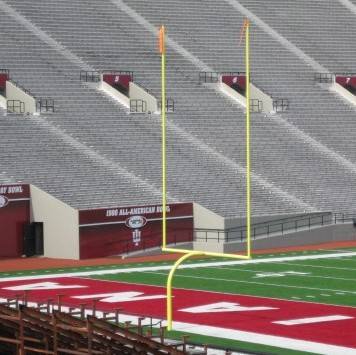 Indiana used to be a football team against which an opponent could gain confidence.
Indiana used to be a football team against which an opponent could gain confidence.
While Illinois football sometimes seems like a perennial bottom-dweller, there are at least peaks to bring the valleys into stark relief (including two BCS games this decade). But with Indiana, the lows are pretty much unbroken. Instead of recent high-profile bowl games, they highlight in their stadium things like the 1979 Holiday Bowl and the 1986 All-American Bowl.
But this year’s Hoosier team had shown signs of life. Despite an unimpressive opening win against Eastern Kentucky, Indiana started 3–0 and in their fourth game gave Michigan all they could handle in the Big House. (Though, once again, the Wolverines were aided by favorable refereeing and eeked out a three point victory.)
Indiana wasn’t anything approaching unbeatable, of course, having lost three straight before their Saturday match with Illinois. But they had a quarterback who makes accurate short passes and people who catch the balls he throws. That fact, coupled with two crucial Illini fumbles, was more than enough to hand Illinois its fifth loss of the year.
It is conventional wisdom among Illinois football fans that Arrelious Benn is wasted talent. No player as good as he is should be as underutilized, or utilized so poorly, as he is. What is not so well known is that this is also true of Juice Williams.
It continues to astound fans just how poorly Williams throws the ball. He misses open receivers more than any starting Big Ten quarterback should. Worse yet, his throws are unpredictable. One week he’ll throw low, or in the grass. The next he’ll sail the ball over the heads of open receivers.
This is almost certainly the result of coaching.
In his freshman year, the main knock against Williams was his throwing velocity. He simply threw the ball too hard, and this made his passes difficult to catch. It was thought, apparently, that if only Williams could take some pace off the ball he would develop some touch. This was a mistake. In a perfectly coached world, instead of trying to force Williams to make throws he ought to be able to make, the offense would have been built around his canon arm. Catering to the passes he could make and forcing the receivers to adjust to their velocity, the offense would have been a nightmare for defensive backs reluctant to step into the path of a Williams throw.
Playing exclusively to Williams’ strength would have limited the playbook, but certainly not more than it has been limited by circumstance. A credible passing game could be built around a man who only throws three or four types of passes, but throws them well. A sturdy running game — of which Williams would be a crucial part — punctuated by quick outs and short crossing patterns, would have been a nice recipe for success. Even better, it would also have highlighted Benn’s skill of getting yards after a catch.
It wouldn’t have been a very exciting offense. But fans will trade excitement for wins any day.








